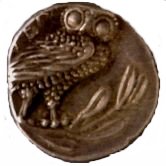Silver: the basis of Athenian power
The silver mines at Laurium
"The Divine Bounty has bestowed upon us inexhaustible
mines of silver, and advantages which we enjoy above all our neighbouring
cities, who never yet could discover one vein of silver ore in all their
dominions." XENOPHON

The Silver Mines
Athens was the only Greek polis (city-state) with
the ability to dig its own wealth straight from the ground. Laurion
was an area near the east coast of Attica rich in siver-bearing ores
which had been exploited since the Bronze Age. In 482 BC a new vein
was discovered which led to a massive increase in activity. Themistocles
persuaded the Athenians to spend this new revenue on building a fleet
of triremes which were used to defeat the Persians at Salamis in
480 BC.
The Scale of Operations
There were about 350 mines producing 1000 talents a year,
worked by 10-20,000 slaves. Mining rights were owned by polis, but leased
to individuals by 10 annually elected poletai. The purity of
the silver (which was protected by law) led to Attic "owls" being widely
respected. They have been found as far afield as India and Algeria.
The design with Athena on obverse and owl + olive-sprig on reverse was
unchanged for centuries.
Processes
-
Mining
Ore extraction from very deep vertical mineshafts, off which were
narrow and cramped horizontal galleries.
-
Preparation of ore
Ore separated from waste in special "washeries" (several have been
excavated in the Laurion area, eg Agrileza, Thorikos).
-
Cupellation
Impure silver heated in a furnace or crucible with materials capable
of absorbing the impurities (principally lead).
Workforce
All were slaves. Numbers were large: Thucydides mentions
20,000 deserting to Decelea (encouraged by the Spartans to put economic
pressure on Athens).
Factories were designed to minimise risks of slaves getting hold of
silver. "Trusty" slaves were given incentives (own houses). Slaves would
be owned by wealthy Athenians (like Nicias) and hired out to the lessees
of the mines. They were usually prisoners-of-war, not criminals. Their
life expectancy was short and they lived and worked in conditions of
indescribable squalor.


